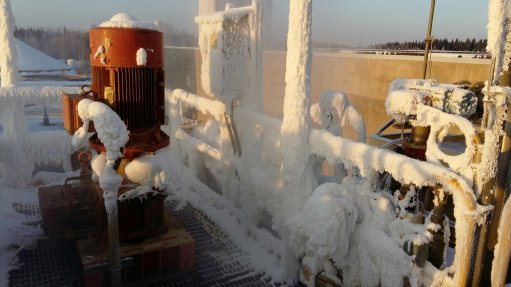
WITHSTANDING FINNISH WINTERS Only the heat-generating bioleach reactors are located outdoors at the Mondo plant, as they can withstand the extreme temperatures
State-owned research organisation for the minerals industry Mintek is partnering with platinum producers in South Africa to improve the recovery of base metals associated with platinum-group metals (PGMs) production.
Mintek GM Peter Craven notes that the challenging economic environment is influencing the growing trend in the global mining industry to recover the maximum possible value from mined resources. The emphasis is, thus, on processes that exploit ore to its full potential; treatments for secondary materials, existing residues and materials that are difficult to treat; more efficient recycling practices; and cost-efficient methods.
He points out that, while South Africa is an international leader in producing many precious metals, the country is less endowed with base metals. As a result, Mintek particularly focuses on improving the recovery of such metals, for example, nickel, which are produced as by-products of platinum production.
Material containing PGMs and base metals produced during the production of platinum at flotation concentrators and matte smelters in South Africa is sent to base metals refineries, which recover the base metals from the material, Craven explains.
“It is these refineries that are of particular technical interest for Mintek in the base metals sector in South Africa.” Therefore, the organisation works closely with base metals refineries to share its expertise in the treatment of PGMs material so that base metals can be efficiently extracted. Mintek has developed advanced systems for process monitoring and the improvement of operational efficiency at these refineries.
Mintek has also developed new solvent extraction and resin absorption technologies that have applications in the platinum industry. However, Craven notes that companies are cautious about spending capital in the current economic conditions, and, thus, suggests that these novel technologies will become more relevant in the future when new investment is justified.
The organisation is also focusing on the international base metals market by conducting extensive research and development in copper heap leaching. While there is currently little demand in Southern Africa for this technology, which is best suited to lower grades of ore, it has been used by some of the biggest copper mines in Chile. Craven emphasises that Mintek has developed an international reputation as a frontrunner in this field.
“The mining industry, in general, is shifting its focus from technology for new greenfield projects to increasing the value of existing projects. This has opened up opportunities in areas such as process control, computer automation and improved operation efficiency. There is also a focus on using more benign reagents that can be recovered and recycled or which have a minimal harmful effect on the environment.”
He adds that Mintek has a range of new technologies at various stages of development waiting to be furthered when there is an upswing in mining and businesses in the sector are more willing to consider new capital investments.
World First
Proprietary nickel sulphide bioleach technology developed by Mintek has been implemented at the world’s first bioleaching nickel recovery plant at talc producer Mondo Minerals’ Vuonos production site, in Finland. The plant is in the final commissioning phase.
Nickel is a by-product of Mondo’s talc mining. However, the nickel-bearing material also contains arsenic, which makes smelting the material unattractive for environmental reasons. When applied to the material, Mintek’s bioleaching process produces a nickel hydroxide precipitate product. In addition, the process produces a stable arsenic-bearing waste suitable for impoundment.
Construction of the plant was completed in 2015 and hot commissioning of the process began in August that year. Mintek oversaw the successful on-site build-up of the bacterial inoculum and provided support and training for Mondo’s technical staff during the inoculation and commissioning of the production-scale bioleach plant.
Commissioning of the entire plant and performance testing of the bioleach process are expected to be completed in the fourth quarter of this year. At full production, the plant will treat about 12 000 t/y of nickel concentrate, producing about 1 000 t/y of nickel.
Mintek believes that the successful completion of the project will demonstrate that the biohydrometallurgical treatment of complex base metal sulphide concentrates is technically and commercially viable.